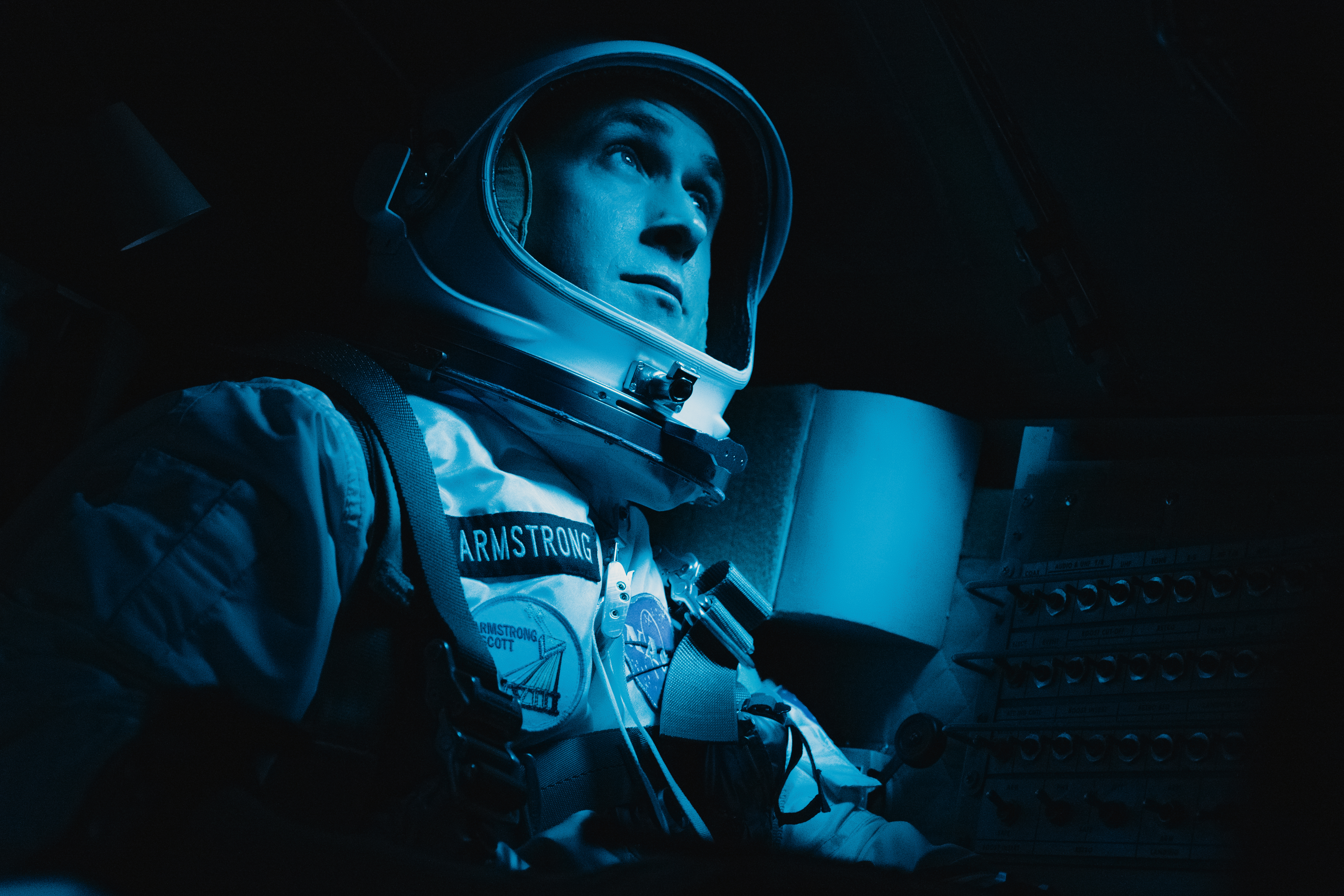First Man is a different kind of NASA movie
In Damien Chazelle's new film, space is something to be appreciated, not conquered


A free daily email with the biggest news stories of the day – and the best features from TheWeek.com
You are now subscribed
Your newsletter sign-up was successful
Most of the technical marvels of generations past — radio, television, cell phones, and the like — are so commonplace now that we barely stop to consider what a miracle they are. But it's still absolutely astonishing that for a few years in the 1960s and '70s, Americans rocketed human beings off our planet, beyond Earth's orbit, and to the moon. We brought them back, too. How in the world did we ever do that?
Throughout First Man — a dramatization of NASA's first moon landing, opening in theaters everywhere this weekend — the Oscar-winning La La Land director Damien Chazelle tries to remind audiences of just what a preposterously dangerous endeavor space travel was back then. He shows suborbital, orbital, and lunar flights from the perspective of the pilots, who experienced some of humanity's most monumental achievements as a frenzied blur of deafening noise, body-rattling vibrations, and fleeting glimpses of spinning dials and blurred scenery.
Ryan Gosling stars in First Man as Neil Armstrong, who at the start of the film has just lost a young daughter to cancer. As part of a generation inclined to keep their emotions bottled up — and as a participant in a succession of competitive military programs, where signs of weakness weren't an option — Armstrong channeled his grief into work, applying to NASA, and serving on multiple Gemini missions before commanding Apollo 11.
The Week
Escape your echo chamber. Get the facts behind the news, plus analysis from multiple perspectives.

Sign up for The Week's Free Newsletters
From our morning news briefing to a weekly Good News Newsletter, get the best of The Week delivered directly to your inbox.
From our morning news briefing to a weekly Good News Newsletter, get the best of The Week delivered directly to your inbox.
First Man is broken up into the stages on the way to the first moon landing, covering the various earthbound tests and orbital trial runs, while also looking back at how in the late '60s the allure of the space program was wearing off for the general public — meaning that Armstrong and his colleagues had to spend part of their workdays lobbying politicians. The movie also spends a lot of time exploring the culture of NASA and observing how the men's combination of cutthroat ambition and stubborn fearlessness was mitigated somewhat by their wives, who supported each other and strove to create a familial atmosphere.
To keep the picture from getting too dry and technical, Chazelle and screenwriter Josh Singer (another Oscar-winner, who co-wrote Spotlight and The Post) pepper the plot with life-or-death crises. In the opening scene, Armstrong almost has a fatal crash. Later, he wrecks a practice lunar-lander, and spins out in a Gemini capsule. Year by year, the NASA equipment gets more modern and shiny, but it still sometimes blows up or goes haywire, nearly sending astronauts hurtling into outer space or plummeting back to Earth.
Movies about humans rocketing to the stars have been around for about as long as cinema itself. By the time we actually made it to the moon, those movies had become more realistic, using images and designs from actual space programs, both from the U.S. and the USSR.
Right around the time of Apollo 11 (a few months before and a few months after, respectively), the films Countdown and Marooned took a more documentary-like approach to a subject that had previously been left to science fiction, speculating seriously about what might happen if someone were stranded in space. Even in the fictional stories about astronauts at the time, the presumption was that they were in mortal danger; and in fact, several of Armstrong's peers did get killed. This is what they lived with back then, and it's reflected in First Man's pervasive sense of fragility.
A free daily email with the biggest news stories of the day – and the best features from TheWeek.com
It's hard not to compare Chazelle's film with two other great American movies about NASA. Writer-director Philip Kaufman's 1983 adaptation of Tom Wolfe's nonfiction best-seller The Right Stuff tells the story of what came before Gemini and Apollo, tracking the crazy lives and times of the Mercury astronauts, and of the test pilot Chuck Yeager whom they all aspired to emulate. Director Ron Howard's 1995 hit Apollo 13 jumps ahead to an ill-fated mission one year after Armstrong's moon-landing, showing how engineering ingenuity narrowly averted a tragedy.
Each of those movies has its own agenda. The Right Stuff is largely about macho bluster and the mighty American public relations machine. Yet through all of Kaufman and Wolfe's raucous satire of the space program as a big, carefully cast television show, the movie also hails the genuine courage and intelligence of these people who strapped themselves into vehicles traveling at breakneck speeds to unfathomable heights.
Apollo 13 humanizes the astronauts more, treating them not as flawed-but-fascinating symbols of Americana, but as number-crunchers who survived one of the most terrifying situations imaginable by pushing past their exhaustion and irritability to solve a puzzle — with the help of an amazing ground crew. The movie is a paean to professionalism.
First Man's purpose is initially a little harder to discern, beyond allowing audience to see and feel what the Gemini and Apollo astronauts went through. During the film's fall festival run (at Venice, Telluride, and Toronto), it got dragged into a silly, ill-informed political controversy, from pundits who claimed that Chazelle never shows the American flag. Actually, the flag's featured quite prominently — both on the moon and off. It's just Armstrong and Buzz Aldrin's planting of the flag that's omitted, because it has little to do with the story First Man is telling.
What becomes clear as the movie plays on is that it's not about who deserves the lion's share of the credit for the achievement itself, but rather about what it meant to Armstrong. The NASA machinery is all there to see, and is all duly applauded, but if Singer and Chazelle do have a political point to make, it's just to note that Apollo 11 succeeded despite loud opposition from citizens and congressmen alike.
But that's all just in the background for Armstrong, who's played by Gosling as someone perpetually lost in thought, using stoicism as a coping device. It's like he's worried he won't get through an ordinary day — let alone a space flight — if he's not calm, quiet, and always thinking three or four steps ahead.
In all the pre-release hubbub over what we do and don't see on the moon, not enough attention has been paid to how Chazelle and his crew shot those climactic sequences: using IMAX cameras and opening up the frame, so that the cramped spaces and overwhelming sensations from earlier in the film give way something big and quiet.
First Man helps audiences appreciate the wild ride of lunar exploration, but also the awe and wonder of it all. In the end, we see one imperfect, easily breakable human being, standing on a landscape no one had ever set foot on before. It's so vast. It's so serene. And he's there.
We did that.
Noel Murray is a freelance writer, living in Arkansas with his wife and two kids. He was one of the co-founders of the late, lamented movie/culture website The Dissolve, and his articles about film, TV, music, and comics currently appear regularly in The A.V. Club, Rolling Stone, Vulture, The Los Angeles Times, and The New York Times.
-
 Political cartoons for February 19
Political cartoons for February 19Cartoons Thursday’s political cartoons include a suspicious package, a piece of the cake, and more
-
 The Gallivant: style and charm steps from Camber Sands
The Gallivant: style and charm steps from Camber SandsThe Week Recommends Nestled behind the dunes, this luxury hotel is a great place to hunker down and get cosy
-
 The President’s Cake: ‘sweet tragedy’ about a little girl on a baking mission in Iraq
The President’s Cake: ‘sweet tragedy’ about a little girl on a baking mission in IraqThe Week Recommends Charming debut from Hasan Hadi is filled with ‘vivid characters’
-
 Walter Isaacson's 'Elon Musk' can 'scarcely contain its subject'
Walter Isaacson's 'Elon Musk' can 'scarcely contain its subject'The latest biography on the elusive tech mogul is causing a stir among critics
-
 Welcome to the new TheWeek.com!
Welcome to the new TheWeek.com!The Explainer Please allow us to reintroduce ourselves
-
 The Oscars finale was a heartless disaster
The Oscars finale was a heartless disasterThe Explainer A calculated attempt at emotional manipulation goes very wrong
-
 Most awkward awards show ever?
Most awkward awards show ever?The Explainer The best, worst, and most shocking moments from a chaotic Golden Globes
-
 The possible silver lining to the Warner Bros. deal
The possible silver lining to the Warner Bros. dealThe Explainer Could what's terrible for theaters be good for creators?
-
 Jeffrey Wright is the new 'narrator voice'
Jeffrey Wright is the new 'narrator voice'The Explainer Move over, Sam Elliott and Morgan Freeman
-
 This week's literary events are the biggest award shows of 2020
This week's literary events are the biggest award shows of 2020feature So long, Oscar. Hello, Booker.
-
 What She Dies Tomorrow can teach us about our unshakable obsession with mortality
What She Dies Tomorrow can teach us about our unshakable obsession with mortalityThe Explainer This film isn't about the pandemic. But it can help viewers confront their fears about death.
